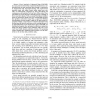1656 search results - page 77 / 332 » Learning and Consistency |
ICML
1990
IEEE
14 years 1 months ago
1990
IEEE
Given an adequate simulation model of the task environment and payoff function that measures the quality of partially successful plans, competition-based heuristics such as geneti...
IJCNN
2008
IEEE
14 years 3 months ago
2008
IEEE
— Fuzzy Associative Conjuncted Maps (FASCOM) is a fuzzy neural network that represents information by conjuncting fuzzy sets and associates them through a combination of unsuperv...
ICML
2008
IEEE
14 years 10 months ago
2008
IEEE
This paper aims to conduct a study on the listwise approach to learning to rank. The listwise approach learns a ranking function by taking individual lists as instances and minimi...
HIS
2004
13 years 10 months ago
2004
Boosting is a general method for improving the accuracy of a learning algorithm. AdaBoost, short form for Adaptive Boosting method, consists of repeated use of a weak or a base le...
UAI
2000
13 years 10 months ago
2000
Algorithms for learning the conditional probabilities of Bayesian networks with hidden variables typically operate within a high-dimensional search space and yield only locally op...

